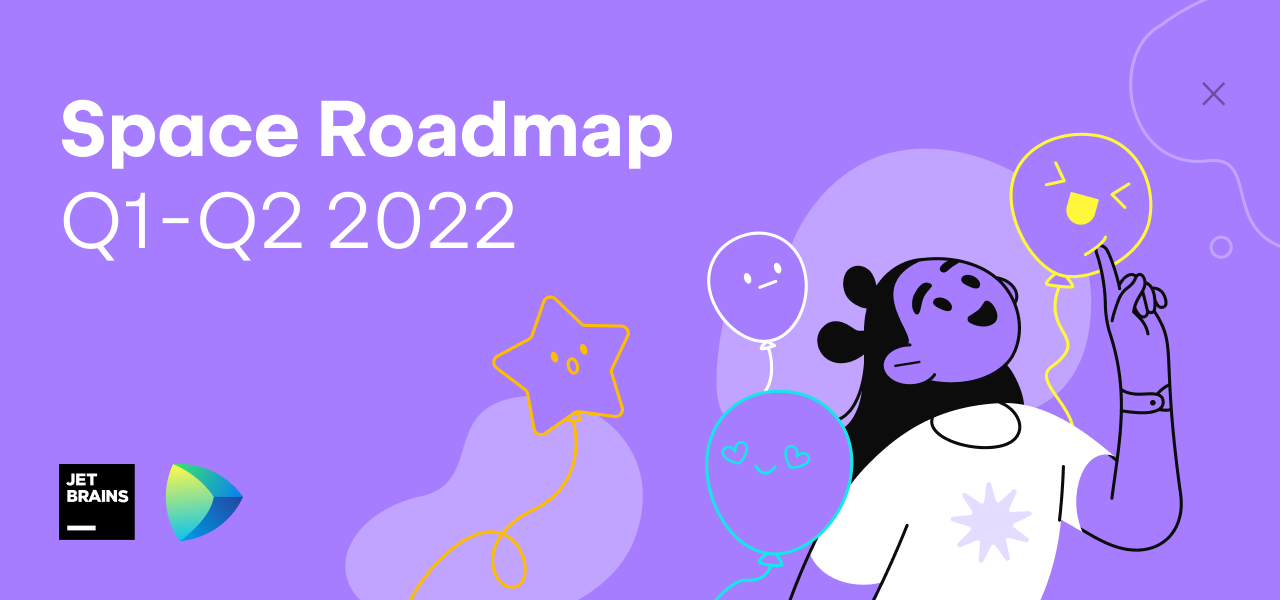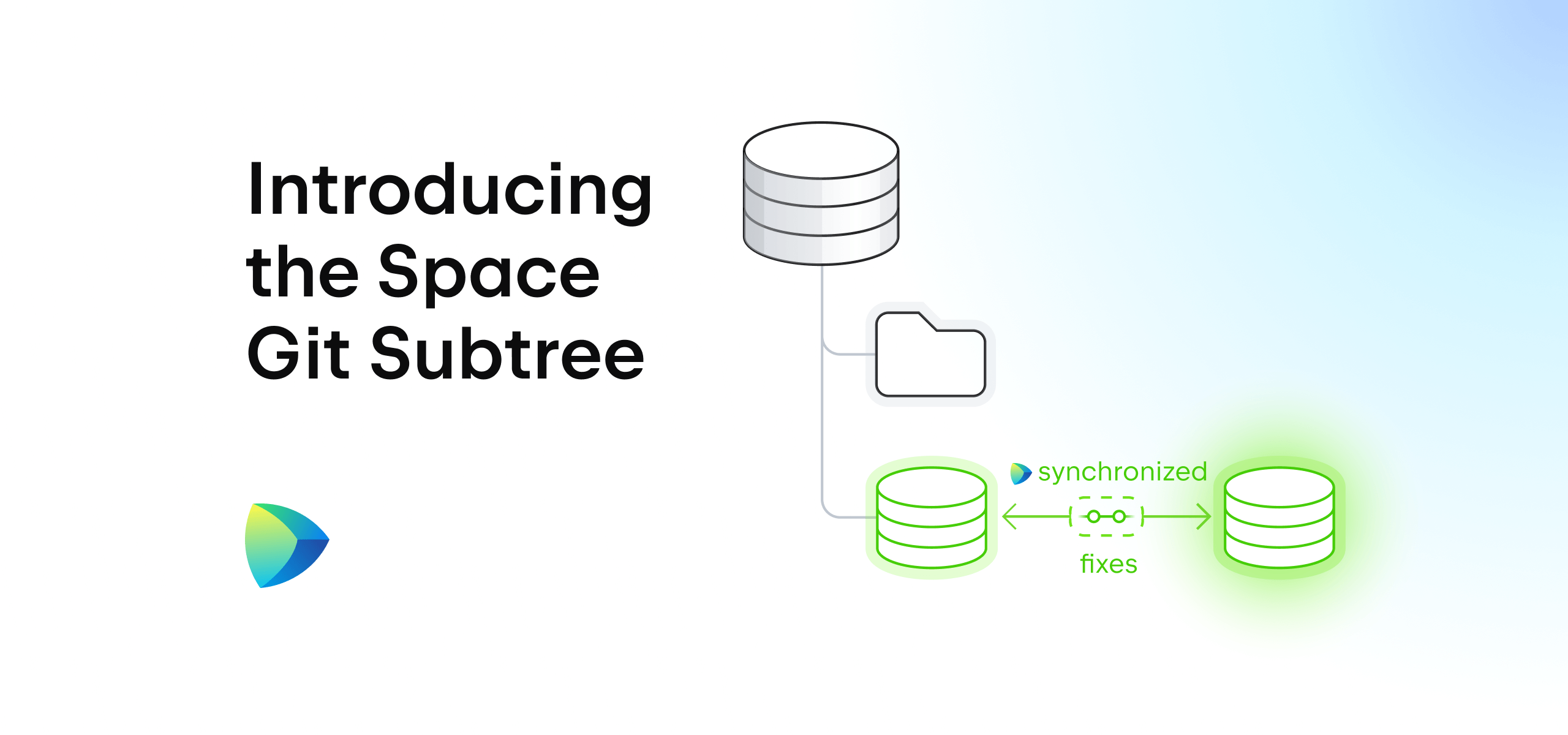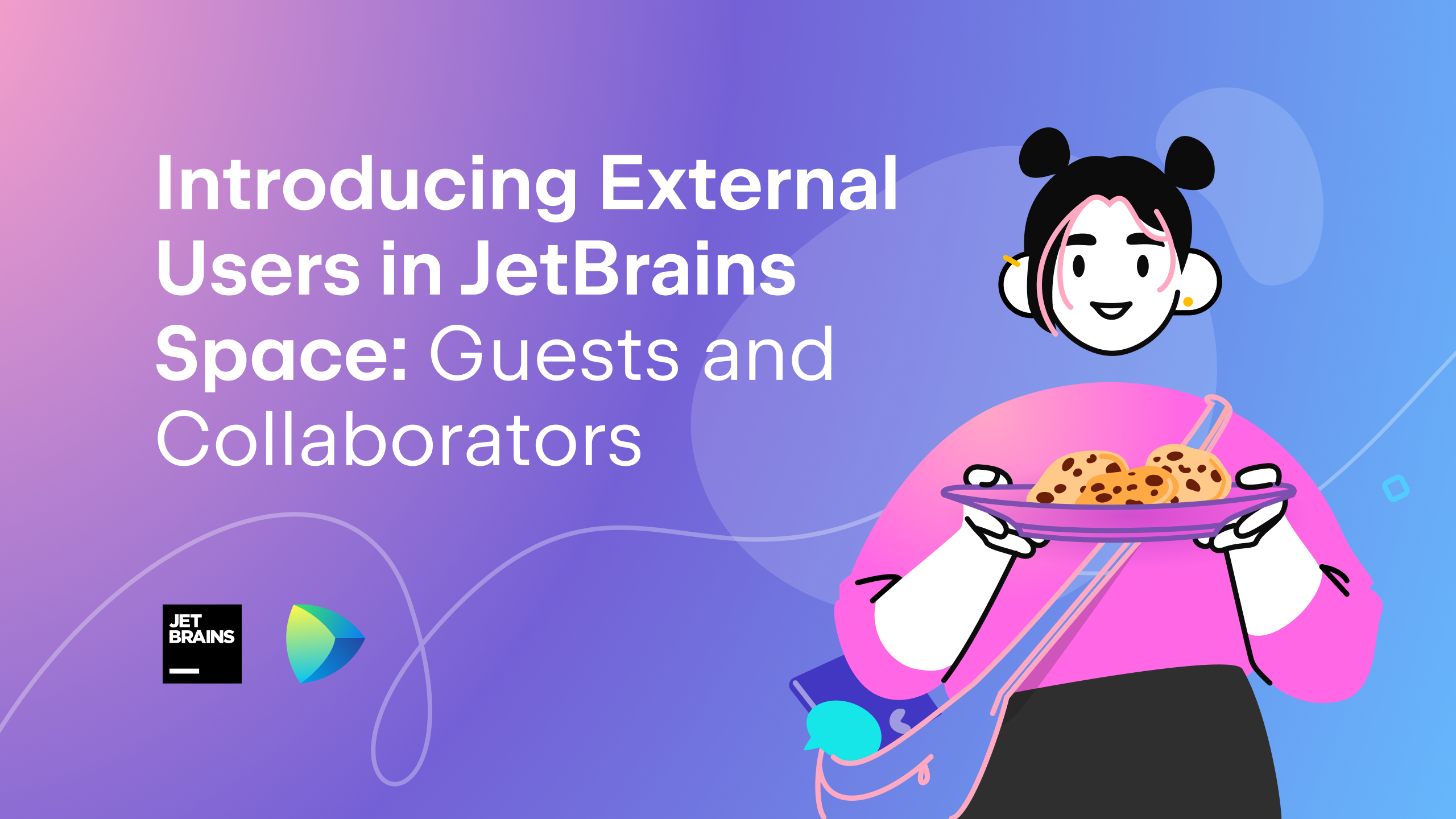Space
The intelligent code collaboration platform
Space is pivoting to SpaceCode, focused on Git hosting and code reviews. Learn more →
Space Roadmap Q1-Q2 2022

2021 Retrospective
First of all, let us admit that we were maybe a little too bold with our plans last year. Space is a huge platform, including more than ten modules that can each be considered as separate products. We wanted to bring in everything from your feedback and our vision, so you can fully adopt Space as an all-in-one solution that covers your entire software development pipeline, but it was just a bit too much to achieve in one year.
We’ve partially delivered the features from the 2021 roadmap, and plan to implement others in 2022. Some of the features, however, have transformed into new priorities and will be delivered later. We’ve also introduced brand new functionality, like subscriptions management, a universal way to manage notifications in Space, and cloud dev environments to spin up and manage JetBrains IDEs backends remotely. We’ll keep enhancing the platform in these directions.
Most of the high priority features from 2021 remain our priority for Q1-Q2 2022:
- On-premises version
We opened a private Beta program in December 2021. We’re actively collecting feedback and planning to open the public Beta in Q2 2022.
- External collaborators
This is one of the most popular feature requests. We understand that inviting your customers or project stakeholders to collaborate in Space might be crucial for your project. Unfortunately, we had to postpone this feature last year as we didn’t have enough resources. However, we’re actively developing it at the moment.
- New hosting regions
We see a lot of interest in Space from China and other countries from the APAC region. This is one of our Infrastructure team’s main priorities for 2022.
- Space Drive/File storage
You’ll be able to upload personal files and all project-related artifacts (images, PDFs, etc.) directly to Space Documents (project and personal). Share, preview, and download files from a single file storage and keep everything you need to work on your project in one place.
- Marketplace
While Space is extensible and provides facilities to add the functionality you need in your organization, we currently don’t feel like we’ve provided enough flexibility and extensibility points to the authors of publicly distributed applications on JetBrains Marketplace. However, we’ve made good progress and believe that we’ll be ready to release Marketplace support in Q2 2022. Meanwhile, you can create applications just for your organization, share feedback with us, and even make them available to other organizations, if you make it multitenant.
- Video calls capability was actively developed through 2021. We made huge progress and opened peer-to-peer calls for the private Beta last year. However, we realize that there is still a lot of work needed. We will continue to actively develop audio and video calls, but we’re not planning to make them publicly available in Q1-Q2.
Postponed features
- Localization: we didn’t manage to make a lot of progress on this last year. We have had to make the tough decision to postpone it. We understand that localization is important for many Space users, especially in certain regions, but have decided we need to first concentrate our efforts on making the platform more functional and work on features, performance, quality, and stability.
Roadmap Q1-Q2 2022
We decided that it is better to divide the work into smaller chunks and limit the roadmap we are sharing to the first half of the year. We’ll be updating our roadmap, carefully listening to and analyzing your feedback, and tuning our own priorities as we progress.
Our main priorities for 2022 are:
- Features (baseline)
- Performance
- Making Space less complicated without compromising the power
- Integrations with YouTrack and TeamCity, and extensibility to support integrations with other vendors.
With this in mind, here is what we’re planning to work on and deliver in Q1-Q2 2022, broken down by Space modules.
Issues
- Sub-tasks to break down your features and user stories into smaller chunks so you can track progress better and work on several tasks in parallel. – released
- Track all issue mentions from chats in the issue history. – released
- Time tracking provides the option to record the time spent on the issues and report it to stakeholders.
- Swimlanes for better support of Scrum practices.
- Issue drafts allow creating issues without publishing them immediately and keeping them as drafts for further publishing.
- Matrix report to create reports based on two issue attributes for a certain period of time.
Git Hosting
- Multi-line comments allow you to comment on multiple lines of code in the code review.
- Suggested edits that allow you to make quick edits to the code and post them as suggestions instead of just leaving comments in merge request reviews.
- Safe Merge allows a user to run automation/TeamCity checks on a specially created merge commit with recent target branch position and merge automatically if the tests are successful.
- View the diff for a specific file in the code review.
- Improve the review details layout by making it scalable with clearer quality gate rules.
- Introduce the notion of “managed branch” (MR\PR draft in GitHub, GitLab), which contains code that you’re not ready to merge yet, but created to track your work. A managed branch can be linked to an issue, and all the commits from this branch will be linked to the issue and can trigger CI/CD. It has a conversation, and you can invite people to work with you on the branch.
- Introduce merge request descriptions.
Automation
- Faster build times in Space Automation. – released
- Support for Vault secrets. – released
- Support for external workers (Linux, Windows, macOS), allowing you to run your automation workload on local resources.
- Non-container steps for running scripts on the host machine.
- Kubernetes workers support for running your automation workload on on-premises Kubernetes.
- File artifacts allowing you to publish and download files, such as archives, rather than just specialized packages in Automation jobs. This should be helpful for mobile development (.apk) and publishing generated reports (zipped xml, json).
- Deployments allowing you to organize the infrastructure around your deployment process. The process itself may happen inside or outside Space. The main idea is to ensure the integrated and automated process of collaboration on and communication about your deployment process. This involves integrating it with Chats and combining notifications from various services into a single stream, supporting integration with Calendars, and integrating it with the VCS.
- Re-work Docker support (Docker-compose, Vanilla docker, kaniko).
- Support more triggering events.
- Re-work the parameters subsystem (templates in DSL, API).
Cloud Dev Environments (Remote development orchestration)
- Multiple IDE support: GoLand, PhpStorm, PyCharm, RubyMine, WebStorm, and CLion (starting with the 2021.3 version). – released
- Docker support in dev environment containers. – released
- Rider support in cloud dev environments.
- The ability to change the IDE version inside a dev environment.
- Devfiles support to allow creating a dev environment template as a file in the repository.
- The ability to reload the dev environment after the changes are applied to the dev environment definition files (Dockerfiles, devfiles).
- Support for running dev environments in a customer-managed resource (k8s, virtual machines).
Space IDE Plugin
- Space dev environments management in the IDEs.
- Enhance the code review integration with the IDEs
- Merge MR/Close Code reviews.
- The ability to collapse/expand the comments in diff.
- All-in-one diff with the ability to view multiple files from the code review at once (the same way it’s supported in the Space web version).
Packages
- Publish packages to the remote repository. – released
- Publishing artifacts to Maven Central. – released
- Remote repositories mirroring, allowing you to cache packages in the local Space repository from remote repositories. – released
- Support PHP/Composer packages. – released
- Support Dart packages.
- Support file repositories.
- Support build caches.
- Fine-grained package repository permissions.
- Package vulnerability analysis.
- Mirror container registries.
- Import packages from an external repository.
Extensibility
- Allow Space applications access to private chat channels. – released
- Extensible menus and UI customization to connect with the external apps or add more internal linking. For example, you will be able to create an app that allows adding the ‘Create a merge request’ or ‘Create Jira issue’ option to the Issues menu.
- Customizable webhooks that can support most of the events that happen in Space.
- Support for iFrames. Add an additional Design section to the Project to show Figma mockups of the project inside Space.
- Develop, deploy, and publish the source code for the following apps: Slack unfurls, and Slack import.
- Improve the developer experience:
- Enable developers to write and distribute (installable, reusable, sharable) apps.
- Improve documentation and HTTP API playground).
- Improve the user experience when installing and configuring an app.
- Sync API to get updates of particular entities in Space (e.g. monitor issues in a project).
Chats
- Improve chat performance with a more stable layout, faster chat rendering, and less time to fetch data on reconnecting.
- Flexible inline elements in Message Constructor.
- Integrate Authorized Unfurls. An application that is authorized in Google and other content sources that allows you to unfurl private content. Unfurls from Figma, YouTrack, TeamCity, Youtube, and other external tools.
Documents
- Documents management enhancements:
- Folders instead of the Books.
- Checklists moved to Documents.
- Upload files.
- Centralized management of all your documents both projects and personal.
- Documents API to communicate and interact with Documents.
- More granular permissions for documents and folders: view-only permission and options to share documents using a link.
- Multiple formatting enhancements in rich-text documents.
- Import documents from external sources.
Calendars
- CalDav support will allow you to view and edit your Space calendar from calendars and mail applications that support CalDAV, such as Mac and iPhone Calendars, Thunderbird, and others.
- Synchronization from external (ICS) calendars (Google Calendar, etc.) – this is our main goal in Calendars. We’re actively moving towards it, but not planning to release it in Q1-Q2.
Mobile Apps (iOS and Android)
- Chats UX equal to the web version.
- Project tab will include issues list and full screen, documents (preview, share), work with checklists, code reviews assigned to me, recent merge requests, navigate to the native chats with the code review, and project dashboard customization.
- Code snippet improvements (multi-line, diffs).
- Code reviews full support.
- Mobile-oriented UX and polishing.
Full-Text Search & Go to
- Speed up search by searching for the main entities (profiles, charts, projects) locally, instead of making server calls.
- Redesign search and navigation for specific contexts (Chats, Projects, etc.).
Projects & Dashboards
- Enabling/disabling features on the project level. For example, you can disable Documents or Packages if you’re not using them for your project.
- Add multiple teams to one project.
- Make personal and project dashboards configurable. Provide the ability to add/remove the widgets on a personal level.
Toolbox Integration
By connecting your Space account to Toolbox, your favorite Space projects will be listed in the Toolbox App, which you can easily open in your IDE of choice.
Please let us know what you think by leaving a comment below or by posting a feature request to our issue tracker. The Roadmap page is in progress now, and we’ll keep updating it on a regular basis throughout the year.
Subscribe to Space Blog updates








